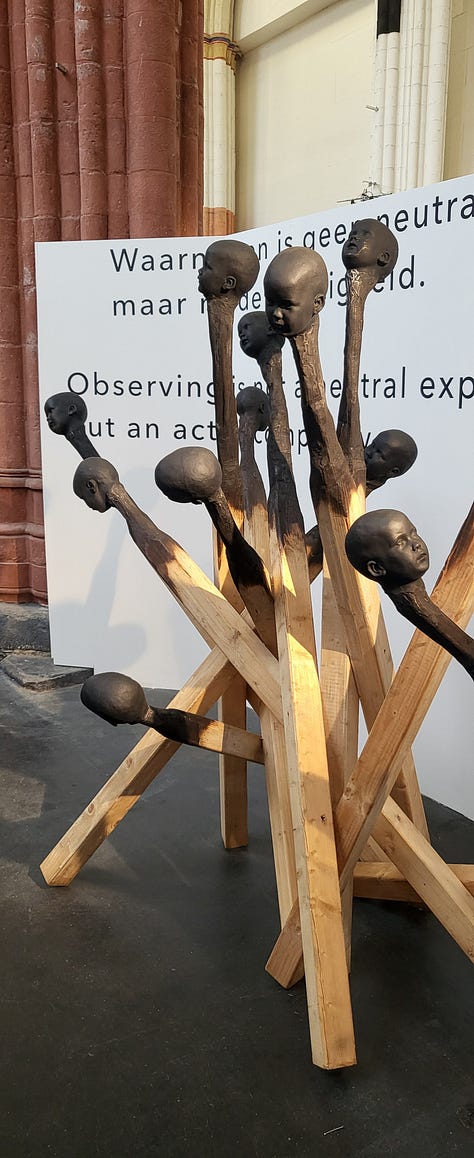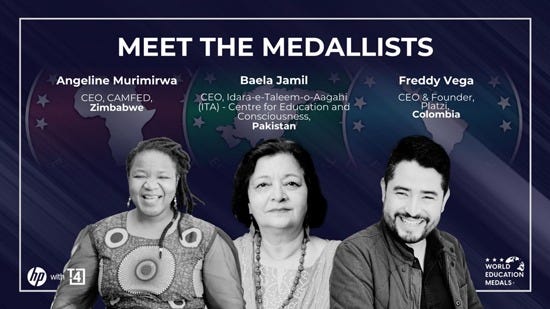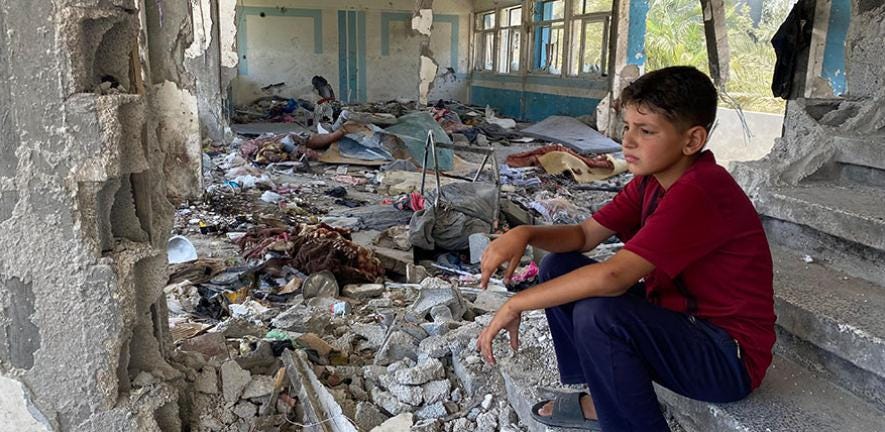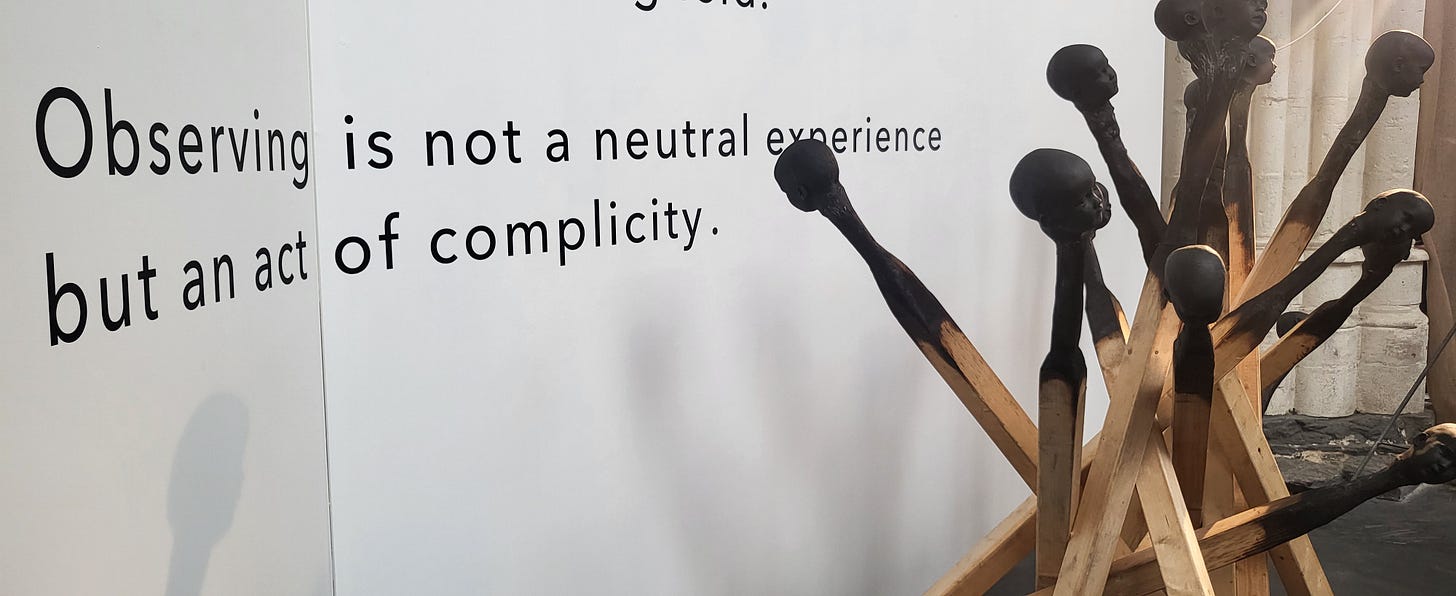Re Education : Issue #13 - The Vanishing FCDO Education Budget
A newsletter about international education development
(If this message does not format properly in your email - please click the “Read in App / View in Browser” above, top right).
Around the developed world aid budgets are being cut, in some cases severely. The EU is expected to cut its budget by c. 2bn Euro (33%), France has recently cut its aid budget by about c. 1.3bn Euro, the Netherlands may cut its budget by a third. Who knows what will happen to the world’s largest bilateral development budget under a Trump second term ?
In the UK, the first Labour budget, although largely aimed at taxing the better off, slashed UK ODA from £15.3bn in 2023 to c.£13.9bn in 2024/5, before a slight restoration to c.£14.3bn in 2025/6 – and still allows for a quarter of the budget to be spent on refugees. In other words, over £2.5bn has been cut over the next two years and more diverted to refugee costs ; as Ian Mitchell points out, that’s actually worse than the Conservatives.
Even before the latest budget, it was also clear that education, as a sector, was suffering under FCDO. Sam Hughes of CGD has put together the chart below showing a massive decline in FCDO funding for education since 2016 : from £945m in 2016 to £330m in 2023, a drop of almost two thirds – back to 2007 levels in nominal terms ; in real terms even worse.
This is only a partial reflection of the Home Office using FCDO funds on refugees, more the unplanned and frankly chaotic cuts to the DFID / FCDO budget since 2016 and especially since 2021. The big talk of supporting education – by which politicians mean girls’ education – is largely rhetorical.
The uncomfortable truth too is that, as belts have tightened, the education cadre within DFID / FCDO has found it difficult to defend to (here-today-gone-tomorrow) Ministers, substantial investment in education in the global south because the impacts rarely meet the short-term results that motivate those politicians.
Education’s reputation under DFID, as one of the most effective and impactful sectors, has been severely dented, partly because its complete conflation with girl’s education means it struggles for recognition amongst the increased list of other priorities in the merged FCDO.
Nevertheless, within this precipitate fall in education funding there are still winners and losers – and the winners in recent years have been (largely northern) research and academic institutions. In a period when FCDO’s funding of education has fallen over 65%, research funding has risen from 2% of the budget to 6%. Spending on education research has more than doubled in the last ten years, from £9m to £18m per annum. That may not last – figures for 2023 show an absolute drop – but it’s still a 5% share. Nor does this account for research within most large implementation programmes.
This may seem like nitpicking - 95% of all aid to education is still programmatic after all – and research has a valuable function in education development. But, it’s important because it’s an indication of policy and political priorities in a cash constrained environment. Those priorities have included support to the UK university sector and a greater focus on trying to influence government education policy in the global south through research (despite no luck using research to influence FCDO allocations to education).
It’s also important because, although research often generates useful insights, and may, occasionally, influence policy, the evidence for its cost-effectiveness as a tool of development support is increasingly challenged by political economy critiques of how system change really happens – as well as the evidence of our own eyes in the dysfunctional politics and decision-making of many northern countries, particularly when faced with severe fiscal pressures.
In fact, towards the end of the well-known DFID funded Research into Improving Systems of Education (RISE) programme a number of the people involved suggested that FCDO should not invest more in research and should instead focus on actually delivering the clear recommendations coming from the RISE investment. Perhaps then it is time FCDO applied some of the rigorous assessment it is so fond of to its own education research programmes.
Of course, the biggest losers are the children of the global south (to the tune of £600m+), and especially those more marginalised and disadvantaged children ; traditionally the focus of FCDO education support, for which, in past years, it has been rightly lauded. There is abundant evidence that supporting countries to improve their education systems, especially their basic literacy and numeracy, is the foundation on which all other development support builds. Is it defensible then that FCDO is now investing so little support to front-line education programmes ?
The government says its priority is “…empowering women and girls” and putting “equality at the heart of all we do”. Fine words : time to fund them.
Andy Brock, November 2024
Subscribe for free and receive each issue of Re Education automatically to your inbox.
“Don’t tell me what you value, show me your budget, and I’ll tell you what you value.” ― Joe Biden
News
Congratulations to all the winners of the World Education Medals 2024. These include Baela Jamil, doyenne of Pakistan education development for decades, for the Asia prize : Angie Murimirwa, the well-known CEO of Camfed, working for girls’ education across Africa, herself on of the earliest recipients of support from Camfed, for the Africa Prize ; and Freddy Vega, founder and CEO of Platzi, the largest tech school in Latin America, for the South American Prize. Well-deserved recognition for all.
Still on the theme of prizes - the World’s Best School Prizes honours the top schools in five categories – community collaboration, environmental action, innovation, overcoming adversity, supporting healthy lives and community choice. This year three of the top five slots were taken by Indian schools and a Ukrainian school in Poland won the prize for overcoming adversity.
For a negative take on this prize giving trend, see this comment by Kevin Starr of Mulago.
The Faculty of Education at Cambridge University and the Centre for Lebanese Studies in partnership with UNWRA has published a report on the shocking projections of learning loss in Gaza.
A three-day meeting of FLEX 2024 in Kigali, focused on scaling foundational learning, has attracted a number of high profile ministers of education. Even online and at a distance there seemed to be more of a commitment and fewer hollow words ; perhaps a real groundswell is building. For example, Rwanda is taking specific action to forgive student loans for those who go into teaching. Strong pleas also from Ben Piper of Gates Foundation to “keep it simple”.
Development
Here’s the opening of my review of Mark Lowcock and Ranil Dissanayake’s great new book “The Rise and Fall of the Department for International Development” :
If I was given to tears, I would have been greeting (as they say in East Kilbride) by the final chapters of this book.
This is a story as tragic as a Shakespearean play, the denouement a mixture of the jealousy of “Othello” and the perfidy that runs through “Julius Caesar” – with Boris Johnson playing the role of Brutus, and many shady Cassius’s in the wings egging him on.
This is not just a book for development types who have worked for, or with, DFID, though those, undoubtedly, will be its most avid audience. It’s also a fascinating account of successful institution building….
Click the button for the full review.
Much comment recently on the Nobel prize award to Daron Acemoglu, Simon Johnson and James A. Robinson for their work on institutional development in developing countries – their best-known book being “Why Nations Fail”. More interesting I think has been the ripostes, led by Yuen Yuen Ang, that their work fails to explain America’s own development in the “gilded age” and cannot explain China’s development at all. See here for an explanatory thread. Her arguments are persuasive, and her books on China well-worth reading. She’s particularly good on different types of corruption and how these differ at different stages of development including the development of institutions.
Voices from the front
A new and very practical 6-page publication from ActionAid aimed at Ministers of Finance in developing countries, is excellent. It summarises the multiple reasons why countries should invest in education, addresses the constraints and doubts Finance Ministries often have, and even provides practical advice for how to resist IMF austerity measures ! ActionAid are sending to all Ministers of Finance ; make sure your Minister of Education reads it too !
If you’re a podcast listener, you might like Let’s Talk Education Africa, started by Stephen Senyo Tettegah. It does largely focus on Ghana, and has a heavy tech orientation, but, there are many good interviews (60+ already) and interesting discussions. Worth a listen.
Voices from the rear
(Gray and Published Research)
The annual Global Education Monitoring (GEM) report is out. This year the focus is on education leadership. See here for the report and here for an interesting challenge to its frequency from Javed Malik.
Very important new blog and research report from Lee Crawfurd, Susannah Hares, Thi Le and Justin Sandfeur of CGD on the gap between perceptions of policymakers of reading levels in their countries – and reality. Explains some of the lack of urgency to address, or even acknowledge, the Learning Crisis.
Also published by CGD, in draft, is a forthcoming paper from a stellar list of northern education luminaries (Angrist, Glennerster, Evans, Filmer, Rogers and Sabarwal) called “How to Improve Education Outcomes Most Efficiently? A Review of the Evidence Using a Unified Metricon”. That mouthful represents an advance on the Best Buys research produced under the Global Education Evidence Advisory Panel (GEEAP), and sets out the case for Learning Adjusted Years of Schooling (LAYS) as a cross-country comparative metric for cost effective interventions in education, arguing that this is a more comprehensive measure taking account of a range of outcome measures and costs.
It’s a step beyond the standard deviation approach, but although easier for the layperson to comprehend, will it be easier to convince decision-makers, especially those (above) whose perception seems to be that things are better than they really are ?
History Lessons



Frans Wuytack is a 90-year-old Belgian activist and artist whose exhibition “Peace” I visited recently in St. Nicholas’s Church in Ghent, Belgium. Wuytack says :
In my sculptures I cannot see time and reality in any other way than in connection with the space and the person within which the event takes place. In an idiosyncratic way I want to give shape to “seeing” and “feeling”. A kind of feeling that you do not “have” but that you “are”. Here the sculptures intervene on two levels. You are not only confronted with the question “What is that ?” but, also with the question “Who am I ?”
…and finally
If you know someone who would be interested in reading this newsletter, please pass on, by clicking the share button below. Subscription is free - subscribers receive each issue of Re Education automatically.











Someone in the know, who needs to remain anonymous, has been in touch to challenge my criticism of the amount going to research in the FCDO budget. They say :
“Research budget growth decisions were made all the way back in 2009-11 really; it takes so long to get programmes procured and live and then spending (which is never in the first year or even second year of a research programme). Even so, the research budget for education has been cut. We weren’t fighting for education attention against any other education budget – we had a 3% protected spend for the research department, and so went up against research funding for health / agriculture / governance etc. The hope was to generate research of a calibre that stopped ministers/spads questioning the viability of education spend because the evidence was seen as so weak (the Best Buys series didn’t help with that) – but the budget decisions weren’t related in process, nor in strategy.”.
If you have a view on this, but need to remain anonymous – get in touch by email at andybrockeducation@gmail.com and I will post your comment like this one.